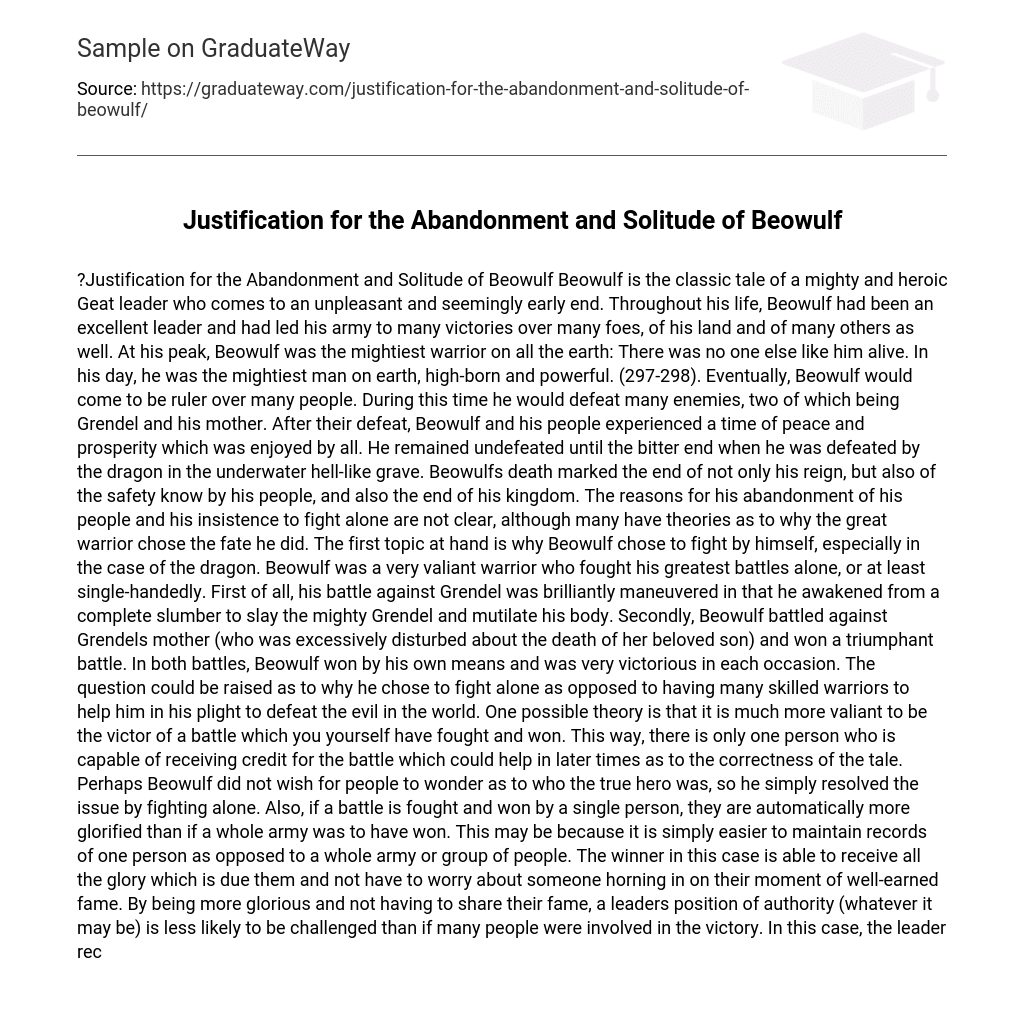Despite meeting an untimely and unfortunate end, Beowulf, a renowned Geat leader, is remembered as an exceptional and victorious commander. He was unmatched among warriors, defeating enemies both within his realm and beyond. With noble heritage and incredible strength, Beowulf held the title of the mightiest individual on Earth during his time.
Eventually, Beowulf became a mighty ruler who governed many individuals. As king, he triumphantly defeated various adversaries including Grendel and Grendel’s mother. Following these triumphs, Beowulf and his companions enjoyed a time of tranquility and wealth that brought happiness to everyone. Tragically, everything changed when the dragon ultimately conquered him in a fierce battle beneath the water’s surface. Beowulf’s defeat not only marked the end of his rule but also caused uncertainty among his subjects and led to the downfall of his kingdom.
The reasons for Beowulf’s choice to leave his people and confront his enemies alone, particularly when facing the dragon, are not clear. Numerous theories exist regarding the decisions made by this famous warrior. The main focus is on comprehending why Beowulf chose to engage in single combat, sometimes even fighting with just one hand. Importantly, he displayed extraordinary courage in his fight against Grendel, skillfully defeating the mighty creature and mutilating its body while awakening from a deep sleep.
Beowulf triumphed over Grendel’s mother, who was deeply saddened by her son’s death. He emerged victorious in both battles, prompting the question of why he didn’t gather a group of skilled warriors to help him defeat evil. One possible reason is that it is considered braver and more honorable to conquer a battle that one has personally fought and won.
To ensure proper credit is given for the battle, Beowulf chose to fight alone. This approach eliminates any confusion regarding the true hero and facilitates accurate historical documentation. Furthermore, a triumph achieved by a solitary individual is typically more revered than if it had been accomplished by an entire army. This may be attributed to the simplicity of maintaining records for one person as opposed to managing them for a whole army or group.
The victor in this situation can receive full recognition without any concern of others taking credit for their well-deserved fame. When a leader holds more glory and does not have to share it, their position of authority (regardless of its nature) is less likely to be contested compared to a scenario where multiple individuals were involved in the triumph.
In this scenario, the leader gains a slight advantage in their position, which is generally highly beneficial for any ruler. It is crucial for rulers to avoid being overthrown due to weaknesses and inability to perform effectively under pressure during battles. The question of why Beowulf deserted his people arises. It is likely that he unintentionally abandoned his kingdom and had no intention of ruining the prosperous realm he had diligently established. One plausible explanation for this occurrence could be that he did not consider the consequences of leaving his throne if he were to depart for any reason.
It is crucial to acknowledge that Beowulf lacked any blood relatives capable of inheriting the throne. Consequently, he had the responsibility of personally choosing one of his subjects as his successor. He wished for this selected leader to avoid encountering opposition from individuals driven by ambition and lacking in accountability and honesty.
The text highlights that Beowulf’s awareness of the consequences of his death on his kingdom and his decision to end the kingdom along with his own life are both evident. This choice had two main objectives: ensuring a more subtle end for the kingdom, avoiding conflicts over succession, and preventing the corruption of the kingdom and throne by an unjust ruler. However, one question remains unanswered: why did Beowulf choose to confront the dragon alone? Despite being aware of the risks associated with battling a fierce creature late in life, Beowulf faced not only old age but also unfamiliar territory, leaving him at a disadvantage.
Maybe his motive for acting in such a manner was to show his subjects that he still possessed strength and bravery as a ruler, even though it put him in a risky situation. If he decided not to participate in the battle, his people would perceive him as a king who had become weaker and been conquered. Conversely, if he elected to fight but ultimately lost, his circumstances would not be better off than if he had abstained from fighting altogether.
The best outcome he could expect was either triumph or death if he opted to engage in combat. And, being the gallant warrior that he was, and with his desire to safeguard his fellow beings from harm, he resolved to confront the dragon in its tormenting abyssal lair. Perhaps Beowulf aspired to achieve immense glory in his final years by vanquishing the mighty dragon single-handedly, or he may have recognized that a noble manner to endure (in spirit) among his kin would be to depart this world through a valiant battle. Irrespective of victory or defeat, Beowulf would be revered for his prowess as a victorious and noble warrior and as an exemplary leader for his people.
Despite having achieved many triumphs, Beowulf’s reign reached its pinnacle. The true motives behind his actions remain known only to him, making it impossible to determine the truth. Therefore, we are left with the task of making educated guesses and awaiting a credible theory that can put an end to our speculation. Until then, we are at liberty to wonder, theorize, and ponder over the mysterious nature of Beowulf.





